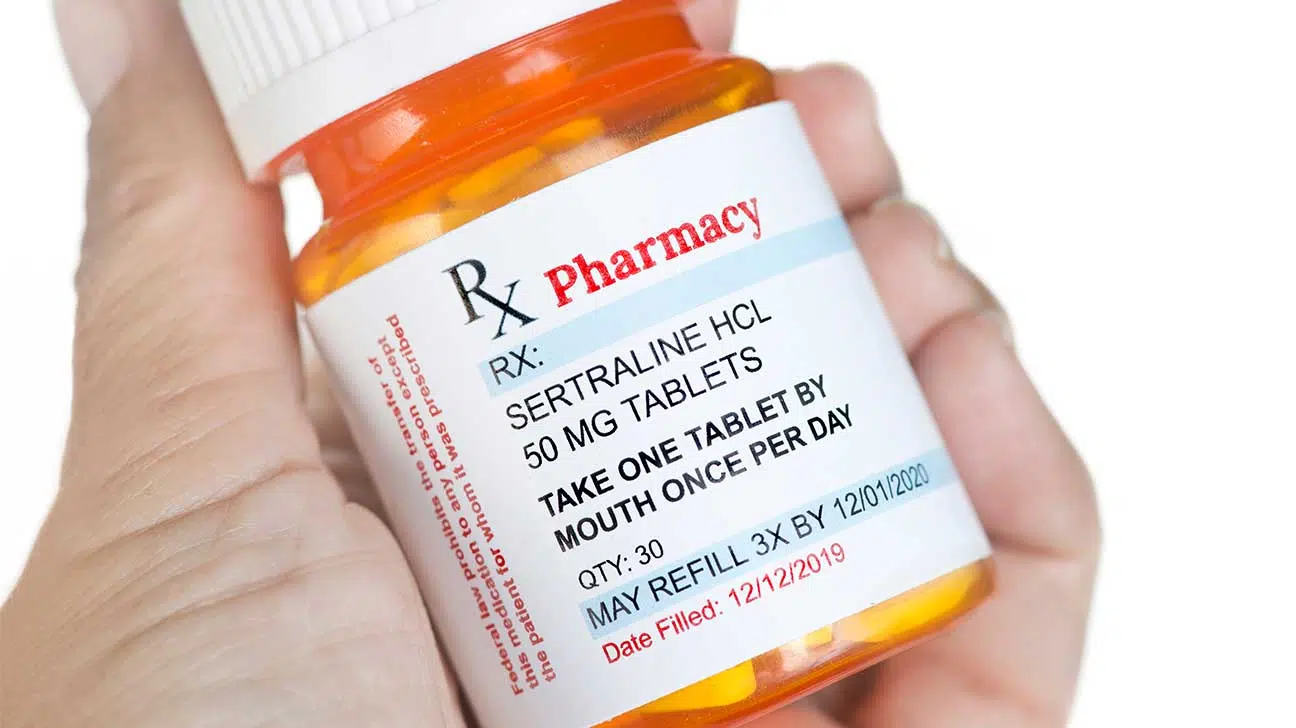
Sertraline, the active substance in the brand-name drug Zoloft, is not a controlled substance.
Controlled substances are determined by the U.S. Food and Drug Administration (FDA) and Drug Enforcement Administration (DEA).
Zoloft comes in a pill form or in an oral solution.
Zoloft is in the SSRI drug class and like other SSRI drugs, it is used mainly to treat major depressive disorder, obsessive-compulsive disorder (OCD), post-traumatic stress disorder, and social anxiety disorder.
Zoloft is sometimes confused with benzodiazepine drugs such as alprazolam or diazepam.
Although the drugs have some similar effects and are even used to treat some of the same conditions, such as panic attacks, benzodiazepines and SSRI drugs are different medications.
Why Is Zoloft Not Classified As A Controlled Substance?
Zoloft is not listed as a controlled substance because the FDA and DEA have determined that it does not have a high potential for misuse.
Drugs that are listed as controlled substances, such as benzodiazepines and opioids, have prescribing restrictions that healthcare providers must follow.
While Zoloft is not an over-the-counter drug, it does not have any of the extra restrictions of controlled substances.
What Drug Classification Is Zoloft In?
The active substance in Zoloft, sertraline hydrochloride, is a selective serotonin reuptake inhibitor (SSRI) drug. Other SSRI drugs include Celexa, Lexapro, Prozac, and Paxil.
SSRI drugs are used mainly to treat depression. They have a stabilizing and improving effect on moods, which is how they deliver mental health benefits.
How Does Zoloft Work?
SSRI drugs like Zoloft work by making the brain chemical serotonin more available in the brain. Serotonin is a neurotransmitter, which carries messages between neurons.
Serotonin is known to increase feelings of well-being. SSRI drugs work by preventing neurons from absorbing serotonin, leading to higher levels of the chemical in the brain.
Higher levels of serotonin can be helpful in treating depression, anxiety, manic episodes that may stem from bipolar disorder, and other mental health conditions.
Are Zoloft And Xanax The Same Type Of Medication?
Zoloft and Xanax are not the same type of medication. While Zoloft is an SSRI drug, Xanax is a benzodiazepine drug. Xanax is used mainly to treat anxiety and panic disorders.
Xanax is a controlled substance, and Zoloft is not. Benzodiazepine drugs have a high potential for abuse and are known to be addictive.
Common Side Effects Of Zoloft Use
Zoloft is a relatively safe drug and SSRI drugs, in general, are known as some of the safer antidepressants available. Still, Zoloft use has some potentially serious side effects.
Side effects of Zoloft may include:
- nausea
- loss of appetite
- drowsiness
- dry mouth
- sexual problems
- dizziness
- nervousness and agitation
- increased risk of bleeding
Dangers Of Zoloft Abuse
Although the drug is not abused commonly, Zoloft abuse can result in major issues.
Drug Interactions
SSRI drugs should not be taken with some other medications. When people abuse Zoloft, the risk for dangerous and potentially life-threatening drug interactions increases.
Drugs like codeine and Tramadol might be ill-advised to use alongside Zoloft
People abusing Zoloft are already going against medical advice from healthcare professionals.
This means they are more likely to ignore the medication guide and boxed warnings and take other drugs that interact dangerously with Zoloft.
Serotonin Syndrome
Serotonin syndrome can happen when too much serotonin accumulates in the body.
This condition is dangerous and could include symptoms like heart problems, trouble sleeping, and changes in blood pressure.
Serotonin syndrome is more likely to occur if someone takes other substances that increase serotonin levels with Zoloft, such as the herbal supplement St. John’s wort.
Pregnancy Issues
Zoloft and other antidepressants may cause issues during or after pregnancy. These issues include breastfeeding challenges and hormonal imbalances.
Talking to a doctor is a critical step when considering taking antidepressants like Zoloft.
Withdrawal Symptoms
Stopping Zoloft use may trigger withdrawal-like symptoms. Antidepressants like Zoloft are usually stopped by using a tapering schedule. Always talk to a doctor before stopping Zoloft use.
Find Help For Zoloft Abuse
Zoloft abuse is not common, but it can happen. Abusing Zoloft could lead to life-threatening complications, including increasing the risk of suicidal thoughts.
Adolescents and young adults may be more likely to abuse Zoloft. Any drug that impacts the central nervous system should be taken with care and all risks should be considered.
If you or a loved one is struggling with Zoloft abuse, now is the time to act. Call our helpline to learn about the best places to seek addiction treatment for Zoloft abuse.
Addiction Resource aims to provide only the most current, accurate information in regards to addiction and addiction treatment, which means we only reference the most credible sources available.
These include peer-reviewed journals, government entities and academic institutions, and leaders in addiction healthcare and advocacy. Learn more about how we safeguard our content by viewing our editorial policy.
- National Alliance on Mental Illness (NAMI)
https://www.nami.org/About-Mental-Illness/Treatments/Mental-Health-Medications/Types-of-Medication/Sertraline-(Zoloft) - National Library of Medicine
https://medlineplus.gov/druginfo/meds/a697048.html


